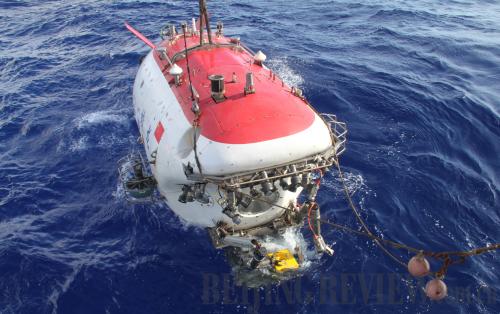|
 |
|
DEEP DIVE: China's manned submersible Jiaolong gets ready to dive into the sea for scientific research on July 16. Jiaolong and its support ship, the Xiangyanghong 09, are exploring the northwest Pacific Ocean to research cobalt-rich portions of Earth's crust as well as life forms living at the bottom of the sea (LUO SHA) |
Judicial Reform
Shanghai, China's main financial hub, initiated a pilot judicial reform program on July 13 to make judges more accountable while also curbing government intervention in court.
Pioneering China's judicial reform, the program will improve management and job security for judicial staff, increase the accountability of judges and unify the personnel and finance management of local courts, according to an office in charge of the reform.
In an effort to improve professionalism, a clear division will be set between judges and procurators, other judicial staff, and administrative personnel, who will be placed under separate management, according to the reform plan.
The reform also targets the decision-making power of the judicial council, limiting its use in complicated cases on which the collegial panel shows major splits.
The plan also requires the judges and procurators at district- or county-level courts to be nominated by provincial-level judicial authority. Funds of local courts will also come from the provincial, rather than the local finance.
China has been pushing for deeper judicial reform to address public complaints over issues regarding the impartiality and competence of courts.
On July 9, the Supreme People's Court published a guideline for judicial reform over the next five years. The guideline includes 45 major measures across eight key judicial issues such as personnel management as well as finances and judicial selection, most of which are included in the Shanghai reform plan.
HK Election Method
China's top legislature has received a report from Leung Chun-ying, Chief Executive of Hong Kong Special Administrative Region (HKSAR), on possible revisions of how the region's chief executive and local legislature will be elected in the future, it was announced on July 15.
Under the Basic Law of the HKSAR, the Standing Committee of the National People's Congress (NPC) has final say on whether to revise the election methods of the HKSAR's chief executive in 2017 and its Legislative Council in 2016, a statement from the NPC Standing Committee read.
The report from Leung is based on the results of a public consultation by the HKSAR Government from December 4 last year to May 3, the statement said.
The NPC Standing Committee will make the decision according to law, it added.
The current chief executive was elected by an election committee in 2012. Hong Kong plans to introduce universal suffrage in the election in 2017.
Pollution Fine
Ten thermal power plants across China had been fined for attempting to evade supervision of their sulphur emissions, said the National Development and Reform Commission (NDRC) on July 15.
Penalties totaling 519 million yuan ($83.66 million) were handed down after investigations into the operation of sulfur-removal devices in coal-fired plants, according to the NDRC.
The commission said that some thermal plants were found to have deliberately shut down their sulfur-removal devices to reduce costs or avoid pollution monitoring.
To try to bring air pollution under control, China encourages coal-fired power generators to install devices to remove sulfur and other pollutants. Plants equipped with such devices receive government subsidies and are allowed to sell their electricity at higher prices.
Among those punished, Yangcheng International Power Generation, a Shanxi-based Sino-U.S. joint venture, faced subsidy cuts or fines to the tune of 125.6 million yuan ($20.25 million).
| 